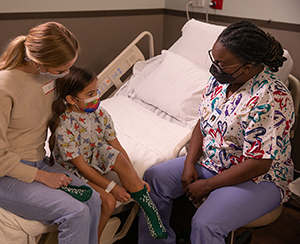Preventing Falls: When Your Child Is in the Hospital
During your child’s hospital stay, falling may be more likely. Nurses and other healthcare providers will do all they can to prevent a fall. You can do your part, too. Here’s how.
Know your child's risk
Talk with your child’s healthcare provider about your child’s risk of falling. In some cases, your child may be at higher risk for a fall and need extra care. Your child may be more prone to fall if they:
-
Are younger than age 3
-
Take certain medicines, such as those for seizures
-
Have a health condition that may affect balance, such as a nervous system problem
-
Have a history of falling
-
Have trouble with balance or walking
-
Are recovering from anesthesia-or taking postsurgery medicine, such as those used for pain
-
Need to use a walker or crutches and have never done so before
Also ask your child’s care team about all the fall prevention strategies in place. These may include keeping clutter out of your child’s room and making sure side rails are always up when leaving your child in a crib or bed. Learn and follow all these guidelines. Make sure other family members and visitors know them, too.
Reduce your child's risk

While your child is in the hospital, you can further reduce their risk for a fall by following these safety tips:
-
Keep the things your child uses often in easy reach. This may include tissues, water, remote control, light cord, and call button. Put personal items, such as a cell phone and eyeglasses close by, too.
-
Make sure your child knows how and when to use the call button. Have them practice using it while a healthcare provider is present.
-
Don't let your child get up without help, even to use the bathroom. Teach them to call a nurse or healthcare provider for help.
-
Encourage your child to sit and stand up slowly when getting out of bed. If they feel unsteady or lightheaded, call a nurse. Some medicines or conditions can make your child dizzy when they change positions.
-
If your child wears glasses, make sure they have them on when moving around.
-
Remind your older child to put on nonskid, well-fitting footwear when getting out of bed. Help your younger child keep nonskid socks on. And instruct them to use handrails in bathrooms or in hallways.
-
Don’t let your child move or climb on hospital equipment or furniture.
-
If your child needs safety equipment, such as a gait belt when moving around, learn how to use it. This belt fits snugly around the waist. It allows you to support your child as you walk together. When directing your child, keep it simple. Go one step at a time.
If your child falls while in the hospital, tell a nurse or other healthcare provider right away. Also tell staff about any mental or physical changes you notice in your child. Your child’s healthcare provider may advise physical therapy. It can help improve your child’s strength and balance.
© 2000-2024 The StayWell Company, LLC. All rights reserved. This information is not intended as a substitute for professional medical care. Always follow your healthcare professional's instructions.